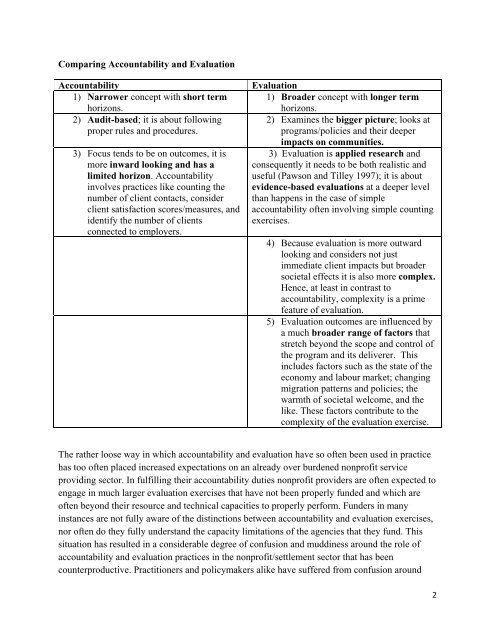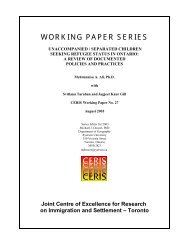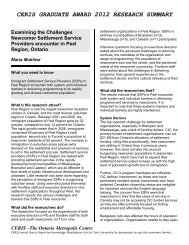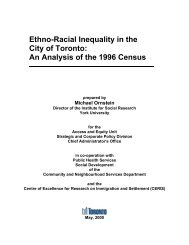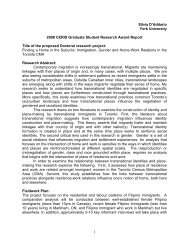Closing Remarks - CERIS
Closing Remarks - CERIS
Closing Remarks - CERIS
Create successful ePaper yourself
Turn your PDF publications into a flip-book with our unique Google optimized e-Paper software.
Comparing Accountability and EvaluationAccountability1) Narrower concept with short termhorizons.2) Audit-based; it is about followingproper rules and procedures.3) Focus tends to be on outcomes, it ismore inward looking and has alimited horizon. Accountabilityinvolves practices like counting thenumber of client contacts, considerclient satisfaction scores/measures, andidentify the number of clientsconnected to employers.Evaluation1) Broader concept with longer termhorizons.2) Examines the bigger picture; looks atprograms/policies and their deeperimpacts on communities.3) Evaluation is applied research andconsequently it needs to be both realistic anduseful (Pawson and Tilley 1997); it is aboutevidence-based evaluations at a deeper levelthan happens in the case of simpleaccountability often involving simple countingexercises.4) Because evaluation is more outwardlooking and considers not justimmediate client impacts but broadersocietal effects it is also more complex.Hence, at least in contrast toaccountability, complexity is a primefeature of evaluation.5) Evaluation outcomes are influenced bya much broader range of factors thatstretch beyond the scope and control ofthe program and its deliverer. Thisincludes factors such as the state of theeconomy and labour market; changingmigration patterns and policies; thewarmth of societal welcome, and thelike. These factors contribute to thecomplexity of the evaluation exercise.The rather loose way in which accountability and evaluation have so often been used in practicehas too often placed increased expectations on an already over burdened nonprofit serviceproviding sector. In fulfilling their accountability duties nonprofit providers are often expected toengage in much larger evaluation exercises that have not been properly funded and which areoften beyond their resource and technical capacities to properly perform. Funders in manyinstances are not fully aware of the distinctions between accountability and evaluation exercises,nor often do they fully understand the capacity limitations of the agencies that they fund. Thissituation has resulted in a considerable degree of confusion and muddiness around the role ofaccountability and evaluation practices in the nonprofit/settlement sector that has beencounterproductive. Practitioners and policymakers alike have suffered from confusion around2


